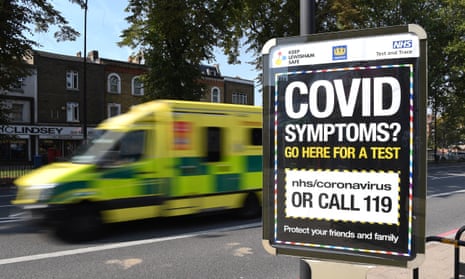Younger women are “bearing the brunt” of the UK’s second wave of coronavirus infections, according to a fresh analysis of hospital admissions prepared by government science advisers.
Hospital records reveal a substantial rise in the number of women aged 20 to 40 admitted for serious coronavirus infections since the beginning of August, a country-wide trend that suggests younger women are now more exposed to the virus.
Calum Semple, professor of child health and outbreak medicine at Liverpool University and a member of the government’s Sage committee, suspects the rise is driven by younger women being more likely to have roles that leave them vulnerable to infection when people no longer adhere to Covid-19 guidelines.
“We’re seeing a big excess,” he said. “Something is wrong in the way society is being managed because women between 20 and 40 are currently taking the brunt of this second wave.”
While the cause of the rise is unconfirmed, Semple believes the surge is driven by a combination of people becoming lax around coronavirus guidelines and younger women being in roles that put them at most risk. There is no evidence it is linked to schools reopening.
He said the higher proportion of women working in hospitality, such as pubs, cafes and restaurants, in the caring sector, and in shops where they come into contact with customers, could leave them more exposed to the virus, particularly when people get sloppy about social distancing and other preventative measures.
The rise has emerged in data Semple gathers continuously from hospitals across England, Wales and Scotland for the Covid-19 Clinical Information Network, or Co-Cin, which provides weekly updates on the disease to the Department of Health and Social Care.
The latest Co-Cin data show that between January and September, 56% of the people treated in hospital for coronavirus were men and 44% were women. But since 1 August, women have accounted for 48% of those treated in hospital, the rise due to almost entirely to a surge in the number of admissions of women aged 20 to 40. There is no rise in admissions of men in that age range.
Semple stressed that the disease is still most harmful to older age groups and those with specific medical conditions, but said the rise in younger women underlined the need for all ages to take the second wave of infections seriously.
“It is not simply a disease of the elderly. We are seeing people between 20 and 40 who are otherwise fit and well who are being affected,” he said. “It’s clear to me that these working women are being exposed to the virus and that can only be because other parts of society are not taking heed of the guidance. The message is that Covid is real and it does affect younger adults.”
Concerns over an increase in infections among younger people, particularly women, were raised in a Sage situation report on 27 August, which highlighted the risks they posed to more vulnerable people they came into contact with. Those infections are now driving up the numbers of people being treated in hospital.
A 2013 study by the Office for National Statistics found that women made up more than 80% of staff in caring, leisure and other services. Chris Rauh, an economist at the University of Cambridge, said women were often less able to work from home, and more women than men were employed in face-to-face retail and hospitality jobs, which were hit particularly hard by the spring lockdown.
“If a greater share of women returned to work, and those jobs are more in face-to-face roles, it could be a factor in the rise,” he said.
Sophie Walker, the chief executive of the charity Young Women’s Trust said: “It is deeply concerning that women who have been on the front line of our care response and economic recovery might also be at increased risk from the virus.
“We urge the government to analyse closely the impact on young women from close contact with the virus via the paid and unpaid work they have been asked to shoulder – from work in care homes, shops, pubs and restaurants to unpaid caring for children who are sent home from school.
“If directives such as ‘eat out to help out’ and the focus on the school return are having a disproportionate impact on women’s health we need to have an urgent response plan.”
